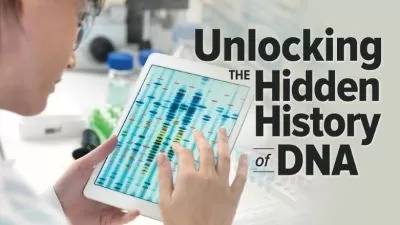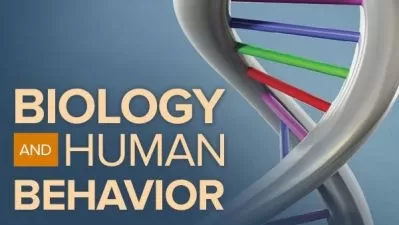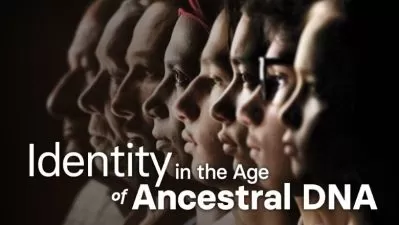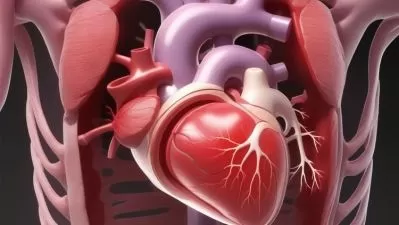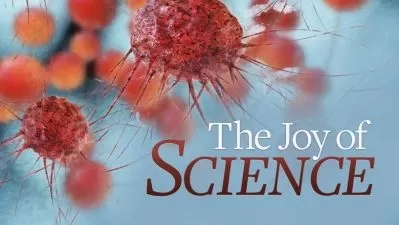What Darwin Didn't Know: The Modern Science of Evolution
Scott Solomon
12:46:53
Description
Writing the final pages of his masterpiece The Origin of Species, Charles Darwin looked ahead to the work yet to be done on his groundbreaking theory of evolution by natural selection. “In the distant future,” he predicted, “I see open fields for far more important researches.”
How right he was. In the more than a century and a half since Origin was published in 1859, evolution has emerged as the fundamental concept in all of biology, explaining Earth's endlessly diverse organisms while spawning new disciplines such as genetics, molecular biology, and evolutionary medicine. The tremendous progress in the fields that emerged from his original theories would have astounded even Darwin, who did not live to see developments such as:
- The discovery of the rules of heredity;
- The identification of DNA as the carrier of genetic information;
- Fossil discoveries that fill major evolutionary gaps and offer new insights;
- The recognition of multiple mass extinctions in Earth's history;
- The ability to read the genetic code of any organism; and
- The power to manipulate genetic material.
And this is just a sample of the deep insights and remarkable conclusions that Darwin's ideas inspired. What Darwin Didn't Know: The Modern Science of Evolution charts this scientific revolution in 24 stimulating half-hour lectures suitable for curious learners at all levels, no matter what your background in science.
Darwin is renowned for his globe-circling voyage on the HMS Beagle when he was a young man, collecting observations that eventually led to the theory of natural selection. The outstanding teacher of What Darwin Didn't Know is no less a world traveler. Professor Scott Solomon of Rice University has explored much of Earth's amazing biodiversity as a field biologist, and he brings hands-on experience to these fascinating lectures, which cover 160 years of non-stop scientific advances.
The Theory of Evolution Takes Off
Professor Solomon begins by laying the foundation of Darwin's theory—how he struggled to find an explanation for the tremendous variety within species, and how he hit on the idea that better-adapted organisms tend to survive and produce more offspring, driving evolution in the direction of beneficial traits. He was already familiar with artificial selection, accomplished through plant and animal breeding. Nature, Darwin surmised, must be following a similar path with natural selection favoring some randomly-appearing variations over others. Professor Solomon tells how another naturalist, Alfred Russel Wallace, worked out an almost identical theory around the same time as Darwin (Darwin magnanimously ensured that their results were published simultaneously).
Darwin continued to refine his theory throughout his life, but much remained to be done by his successors. For example, the biggest gap in Darwin's knowledge was the science of genetics, which was single-handedly pioneered by a little-known Austrian monk and part-time botanist named Gregor Mendel. Largely unnoticed until the early 20th century, Mendel's conclusions about the discrete nature of hereditary traits proved to be the key to explaining how traits can pass intact from one generation to the next. With this, Darwin's theory that adaptive mutations can be transmitted gained a sound basis, and evolution took off as a rigorous and powerfully predictive science, accumulating steady improvements to Darwin's original ideas, such as:
• Natural selection in real time: Darwin believed that evolution always advances with extreme slowness. But biologists in the field have documented wild species—from Galapagos finches to flies infesting fruit—that acquire useful adaptations with stunning speed, sometimes in only a few generations.
• Plate tectonics: Darwin noticed that obviously related species often exist on opposite sides of the world's great oceans. This mystery was solved by the theory of plate tectonics, which shows that the continents move, dividing populations, which then evolve separately while retaining many common characteristics.
• Universal genetic code: Darwin introduced the “Tree of Life” and the possibility that all of life evolved from a common ancestor, a view that was largely rejected in his own time. But biologists have demonstrated that every known type of life—from bacteria to human beings—uses the same DNA code inherited from a single ancestor.
The Road to Humans
Darwin did not deal with the evolution of humans in The Origin of Species, saving that controversial topic for The Descent of Man, which he published in 1871. Together with his colleague Thomas Henry Huxley, Darwin argued that humans share a common ancestor with the great apes, based on the many similar anatomical features we share with them. In What Darwin Didn't Know, you learn that the evidence for this connection has grown impressively since Darwin's day. For example, recent DNA analyses show that our closest living relatives are chimpanzees. Next closest are gorillas and then orangutans. While the last common ancestor of all four lived around 10 million years ago, we shared a common ancestor with chimpanzees until as recently as 5 to 7 million years ago. You also explore the following intriguing findings and conjectures about human evolution:
• The perplexing path to us: Huxley proposed the classic view that humans evolved in a linear progression from primitive apes. But fossil discoveries show that the evolutionary path was much more complicated, with many branches, sub-branches, and dead-ends, along with one particular offshoot leading to Homo sapiens.
• Neanderthals and Denisovans: Two extinct branches of the human family tree are the celebrated Neanderthals and a recently discovered species or sub-species called the Denisovans. Both interbred with humans at some point, and a small percentage of their DNA has spread widely through modern human populations.
• The future of Homo sapiens: Is human evolution over thanks to modern medicine? Some biologists think so, but major evolutionary changes may be in our future as we exploit our ability to edit the human genome. Furthermore, any humans who leave the planet will face strong evolutionary pressures in extraterrestrial environments.
Evolution Is Inevitable
Professor Solomon points out that Darwin didn't just suggest that species can evolve. One of the most important messages from the modern science of evolution is that evolution is a necessary feature of life. As long as life includes heredity and reproduction, all living things will evolve. Even a species that appears to have stayed the same for millions of years will turn out to have undergone many small changes, just to keep up with a changing environment. In short, evolution isn't just possible. It's inevitable.
In the final paragraph of The Origin of Species, Darwin slyly compared his discovery of evolution by natural selection to the revolution wrought by Isaac Newton with his law of universal gravitation. “There is grandeur in this view of life,” Darwin wrote about his theory, “…that, whilst this planet has gone cycling on according to the fixed law of gravity, from so simple a beginning endless forms most beautiful and most wonderful have been, and are being, evolved.”
Just as Newton had no idea about Einstein, Hawking, or his many other successors, so Darwin was in the dark about the brilliant scientists who would build on his work, creating the biological golden age that we are living through today—a story told masterfully by Professor Solomon in this thrilling course.
More details
User Reviews
Rating
Scott Solomon
Instructor's CoursesScott Solomon is an Associate Teaching Professor at Rice University, where he teaches ecology, evolutionary biology, and scientific communication. He received his PhD in Ecology, Evolution, and Behavior from The University of Texas at Austin. He has also worked as a visiting researcher with the Smithsonian Institution in Washington DC and with São Paulo State University in Rio Claro, Brazil.
Scott has taught field biology courses at Rocky Mountain Biological Laboratory in Colorado and in the rainforests and coral reefs of Belize. He has also been a resident associate at Baker College, one of Rice’s residential colleges, and served as a faculty fellow at Rice’s Center for Teaching Excellence, where he acted as a liaison to other faculty. He received the George R. Brown Award for Superior Teaching and the Outstanding Undergraduate Research Mentor Award from Rice University as well as the Rising Star Award from the University of Illinois Laboratory High School.
Scott is a member of the American Association for the Advancement of Science and the Society for the Study of Evolution. He also serves as an associate editor for the Journal of Tropical Ecology. He regularly lectures on science topics at museums, schools, churches, and TEDx events. His writing and photography have appeared in such publications as Aeon, Nautilus, Slate, and WIRED. He is the author of Future Humans: Inside the Science of Our Continuing Evolution.

The Great Courses
View courses The Great Courses- language english
- Training sessions 24
- duration 12:46:53
- English subtitles has
- Release Date 2023/06/06






